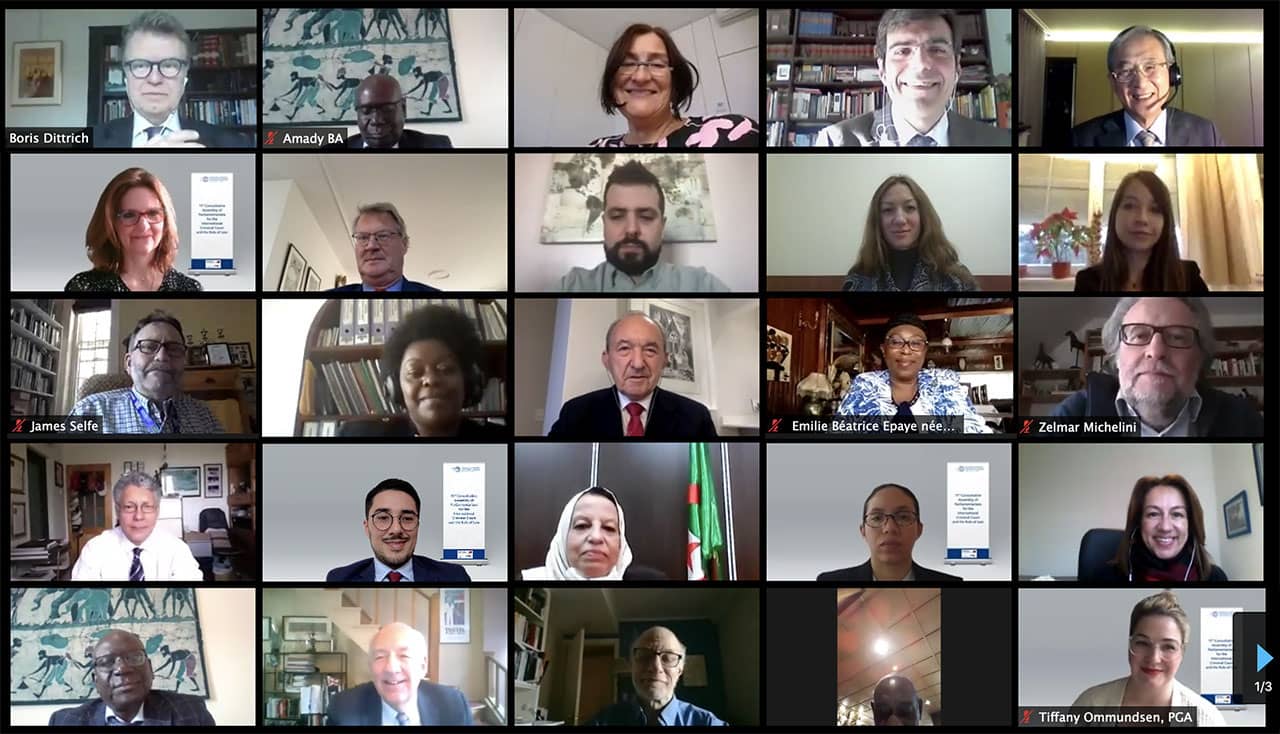A wind of change at the International Criminal Court
This 2nd edition of the Campaign Update for the Rome Statute of the International Criminal Court (ICC) of Parliamentarians for Global Action (PGA) focuses on the changes of leadership at the Court, the outcomes of our annual Consultative Assembly of Parliamentarians for the International Criminal Court (CAP-ICC), and our accomplishments despite the remoteness of our work due to the global pandemic.
While PGA and its Members adapted to the global health crisis, all regions of the world were seriously affected by it. Parliaments from all around the world tried to continue their work virtually while most of the resources were allocated to fighting the pandemic. Even if in-person activities planned during the second half of 2020 had to be postponed due to the COVID-19 emergency, PGA managed to conduct an array of online advocacy events and provide technical assistance to its Members when requested in all of its programs and campaigns.
During the summer, the Secretariat organized the 8th Middle East and North Africa (MENA) Parliamentary Working Group on the Fight Against Impunity, where legislators from Lebanon, Morocco, and Tunisia met to exchange on the best strategies to fight impunity in their region.

Most notably, Hon. Amina Maelainine (Morocco) reaffirmed her commitment to promoting Morocco’s accession to the Rome Statute. At the request of MPs from Tunisia, the Secretariat also provided technical assistance on drafting a comprehensive legislation to implement the obligations under the Rome Statute of the ICC. PGA also submitted to the Chairwoman of the PGA National Group in Burkina Faso, Hon. Reine Sakandé, an analysis of the legal framework related to the fight against impunity as well as suggestions on how to strengthen it. In terms of advocacy, PGA participated in an event organized by the Malaysian Bar Council on International Justice and Universality and the need for Malaysia to access the Rome Statute.
During the fall, PGA conducted important advocacy work in relation to the Rome Statute and its system. It notably co-hosted a panel discussion on the limits to the Security Council veto power when dealing with atrocity crimes especially considering the threatening effect of these crimes on peace and security – exacerbated by the COVID-19 pandemic. In addition, PGA partnered with the Parliamentary Assembly of the Council of Europe (PACE) during a webinar dedicated to the improvement of the system for the nomination and election of judges at the ICC. Considering the election of six new judges and the new Prosecutor, this event aimed at finding solutions to ensure merit-based and transparent elections of ICC officials in the future. Upon request, the Secretariat also provided technical assistance on drafting a comprehensive legislation to implement the Rome Statute of the ICC in Ghana.

On 19-20 November, PGA and the PGA National Group in The Netherlands, co-hosted the 11th Consultative Assembly of Parliamentarians on the ICC and the Rule of Law (CAP-ICC). 148 participants, including 85 Members of Parliament from 41 regions worldwide, participated in this unique international conference, which was exceptionally held online due to the pandemic. This event was organized to create and sustain a global parliamentary constituency for the Rome Statute system and to foster exchanges between ICC officials, States Representatives, Members of International Organizations, civil society, and experts. Several important outcomes came out of this international conference, including:
- The Draft Plan of Action on the Universality, Effectiveness, and Integrity of the Rome Statute system against impunity where Parliamentarians made important resolutions, including to ensure the adoption of domestic legislation that incorporates the definitions of the crimes and general principles under the Rome Statute and its amended version; to intensify their efforts to ensure that the universality of the Rome Statute in its most recent amended version is mainstreamed as an objective in all available mechanisms of inter-parliamentary relations and programs of actions; and to ensure the adoption of domestic Magnitsky-type legislation as an additional tool in the fight against impunity (for more information on Magnitsky-type sanctions, please visit our website here).
- Rep. James McGovern (United States), Co-Chair of the Tom Lantos Human Rights Commission and PGA Member, made a compelling statement on the USA’s position on the Rome Statute system against impunity. Considering that only very few Parliamentarians in the United States have made public statements against the “sanctions” that were imposed by the Trump Administration on ICC officials – including Sen. Patrick Leahy, Rep. David Cicilline, Rep. Jamie Raskin, Rep. Rashida Tlaib, Rep. Andy Levin, and Rep. Ilhan Omar – this statement by Rep. James McGovern was of great importance to support the ICC and its work.
- Rep. Ángela Maria Robledo (Colombia),PGA member, requested in a letter to Mr. James Stewart, ICC Deputy Prosecutor, and Professor Patricia Viseur Sellers, Special Advisor on Gender of the Court, that the Office of the Prosecutor continue investigating sexual and gender-based violence allegedly committed by state actors in Colombia. This communication was further disseminated in national and international media outlets, showing the great importance of events like the CAP-ICC as they allow Parliamentarians from all around the world to directly exchange with ICC officials on their country’s situation.
- Statements were made by Dep. Béatrice Epaye (Central African Republic), PGA Member, and Hon. Salih Mahmoud Osman (former opposition MP, Sudan) regarding the importance of maintaining a strong cooperation with the ICC to strengthen accountability and capacity building at the national level. Dep. Maelainine (Morocco), also reminded her colleagues of the prerogatives they have as Parliamentarians, to not only legislate but also control the actions of the Executive branch of their country.
From 14-16 and 17-23 December 2020, PGA actively participated at the 19th Assembly of States Parties (ASP) through its Secretariat based in New York and The Hague. The work that PGA has carried out over the years to advance the universality of the Rome Statute and to strengthen the capacity of domestic accountability mechanisms was recognized in the Report of the Bureau on the Plan of action of the ASP for achieving universality and full implementation of the Rome Statute of the International Criminal Court.


